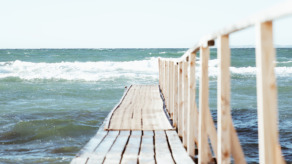Lessons learned from vacations

Vacations often don’t go entirely according to plan. But that’s not such a bad thing, discovers journalist Caroline Buijs. It teaches you to look at things in new ways, for example, and also that no amount of preparation can guarantee the desired result.
It must have started when I was around 25: the guilty pleasure of ordering stacks of travel brochures in January and daydreaming over all the beautiful pictures. I loved the photographs of beaches with palm trees and a turquoise sea, rice fields in many hues of green or a cottage in the English countryside—right down to the floral wallpaper.
But my daydreaming also led to something else that was less fun: disappointment. Because whenever I visited one of the destinations from the travel brochures, the photos that I had stored in my head rarely matched up with reality. That palm beach was full of hungry sandflies with a vicious bite, the rice fields were not any hue of green at all because the rice had just been harvested and, in the little English cottage, the floral wallpaper had been scratched off by a border collie. It was a world away from the experience I had when I went on vacation alone with friends—instead of my parents—for the first time.
We hadn’t seen much more than a blurry black-and-white photo of the campsite on the Dutch island of Terschelling in an old guidebook, and we didn’t give it much thought either. We slept in a faded orange family tent, welcomed everything that crossed our path that summer (sun, rain, nice boys) and had a great time. That vacation was bound to be successful from the get-go, no matter what, because we hadn’t thought about it too much in advance, let alone built up our expectations.







